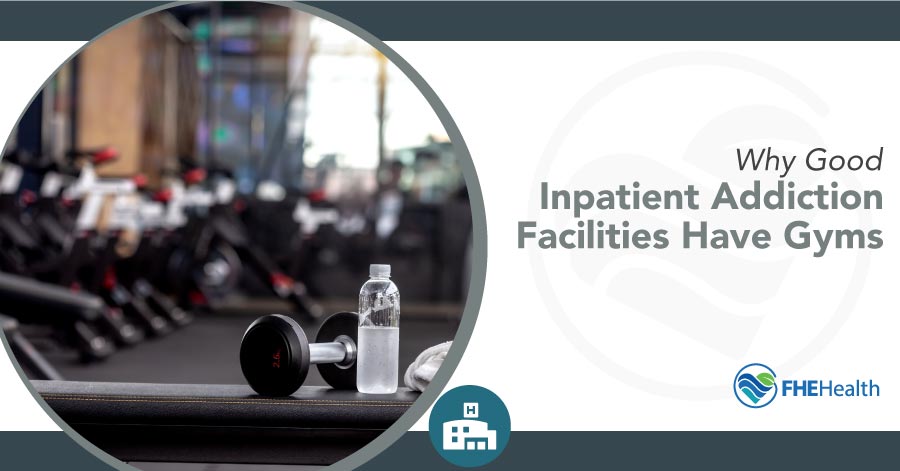
Many people who enter a rehab facility or undergo treatment for a mental health condition strive to better themselves physically. Embarking on a physical and mental wellness journey simultaneously can help a person redirect their focus and occupy their mind. Besides the opportunity to become healthier overall, receiving treatment at a facility that has a gym for recovering addicts can provide other benefits.
How Exercise Helps in Recovery
It’s no secret that exercise offers many physical and mental benefits that help individuals perform and feel better in their everyday lives. When you’re going through recovery at an inpatient facility, these perks of exercise are just as important, if not more so, to your overall well-being. The changes to your body that drugs and alcohol cause can leave you feeling anxious or depressed once you stop using them.
By throwing yourself into a healthy exercise routine during your time in rehab, it’s possible to better manage these emotions. According to the NHS, the benefits of physical exercise include reduced risks of heart disease, Type 2 diabetes, some types of cancers, stroke, osteoporosis, obesity and premature mortality.
The NHS also suggests that exercise can improve your sense of self-worth and body image and enhance your cognitive function. In many ways, exercise can act as a substitute for substance use while in treatment because patients can refocus their time, mental efforts and physical energy on their fitness journey. This leaves less time for dealing with withdrawal symptoms, thinking about using or looking for ways to obtain drugs or alcohol.
Habits formed while in rehab are the foundation for life after you return home. When you get into a healthy routine during your inpatient program, you’re likely to maintain those habits once you leave and settle back into your daily life outside the facility.
Reduce Stress
Exercising can help reduce your stress level during recovery. Exercise releases endorphins in the brain, and a 2017 review found it’s one of the best behavioral techniques for self-regulating your mood for this reason.
Decrease the Probability of Relapse
Exercising while in recovery can help reduce your likelihood of relapsing. Considering that relapse rates range from 20% to 80% over the long term, taking steps beyond mental health treatments to support your recovery gives you the best chance of success. A 2014 meta analysis indicates that physical exercise increases the rate of abstinence from substance abuse by 95%.
Ease Withdrawal Symptoms
The same analysis also found that exercising while in recovery can ease withdrawal symptoms. The results indicate that the type of exercise a person does also has an impact on how effectively it helps manage withdrawal symptoms. Walking and jogging were found to help with withdrawal symptoms in some participants, as were moderate- and high-intensity aerobics. Low-intensity exercises had a different impact on people recovering from substance abuse, but they’re still considered helpful in recovery. Some low-intensity exercises include yoga and tai chi.
Why Having a Gym at an Inpatient Center Is the Mark of a Good Facility
A good rehabilitation facility should offer inpatients access to a high-quality gym where they can exercise and take care of their bodies during recovery. This amenity marks a reputable facility because it demonstrates an understanding of the mind-body connection and how important your physical health is to your mental health, and vice versa. Facilities with a gym or rehab fitness center are actively working to integrate physical interventions with mental health treatments.
Ideally, an inpatient center should focus on supporting your development as part of your overall health. Rather than isolating your addiction or mental health condition as something that requires treatment through therapy or medication alone, bettering yourself physically, socially and creatively can all increase your chances of maintaining your mental health after leaving your treatment program.
Our Facility’s Gym for Recovering Addicts
At FHE Health in Florida, we have a wellness center as part of our inpatient facility to help support patients on their journey to recovery. The center features a gym, swimming pool, green spaces and rooms for massage therapy. The purpose of the wellness center goes beyond supporting people participating in inpatient treatment programs. The goal is to help you develop healthy habits you can carry into your daily life outside of rehab for better long-term results.
In addition to a fully equipped setup in the recovery gym, a variety of programs and activities are offered at our FHE Health wellness center. Inpatients can take part in neuro rehab sessions to retrain the brain or breathwork therapy for healing from past traumas. The center also hosts yoga classes, a low-intensity form of exercise proven to support addiction and substance abuse recovery.
During treatment for addiction, working out provides a great way to release stress and boost your mood to overcome feelings of anxiety and depression that can accompany withdrawal. Our wellness center also offers acupuncture treatments, which can help alleviate withdrawal symptoms and cravings in the early stages of the recovery process.
Seek Help to Turn Over a New Leaf
If you’re seeking support for overcoming addiction or mental health conditions such as depression, FHE Health has the facilities to aid your recovery. We go beyond offering care for mental health by providing the space for you to focus on building your physical strength and wellness so you can live a healthier life after completing your inpatient program.
Our compassionate team of counselors is standing by 24/7 to take your call at (833) 596-3502. If you need professional help to get your life back on track, we’re here for you.






